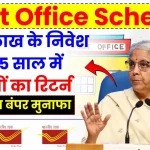
If you’re looking for a safe and reliable way to grow your savings, fixed deposits (FDs) continue to be one of the most trusted investment options in India. And here’s the exciting part — with the current fixed deposit interest rates, you can invest ₹10 lakh and earn up to ₹1,40,000 in just 4 years and 7 months. Sounds solid, right?
This article breaks it down for you — how it works, which banks offer the best rates, and what you should know before investing. Whether you’re a cautious investor, a senior citizen seeking steady income, or a working professional planning your future, this guide will walk you through everything — with data, examples, and practical advice.
Fixed Deposit Interest on ₹10 Lakh Investment
| Feature | Details |
|---|---|
| Investment Amount | ₹10,00,000 |
| Tenure | 4 years and 7 months (approx. 55 months) |
| Average Interest Rate | 7.00% p.a. (varies by bank) |
| Total Profit (Interest Earned) | ₹1,40,000 to ₹1,70,000 (compounded quarterly) |
| Maturity Amount | ₹11,40,000 to ₹11,70,000 |
| Risk Level | Low (capital-protected) |
| Best Banks (April 2025) | HDFC Bank, ICICI Bank, SBI, Axis Bank, Central Bank of India |
| Compounding Frequency | Quarterly (most common) |
Investing in a fixed deposit of ₹10 lakh for 4 years and 7 months can give you a solid profit of ₹1,40,000 to ₹1,70,000, depending on where you invest. It’s a low-risk, high-trust option especially suitable for those looking to park their money safely while earning decent returns.
With banks and the post office offering attractive rates in 2025, this could be the right time to lock in your funds and start earning. Just remember to compare, plan tenure wisely, and keep an eye on tax rules.
What Are Fixed Deposits and Why Are They So Popular in India?
A fixed deposit (FD) is a financial instrument offered by banks and post offices where you deposit a lump sum for a fixed period at a fixed interest rate. Your money stays locked in, and you get guaranteed returns.
But here’s why millions of Indians trust FDs:
- Safe and secure: Zero risk of market fluctuations.
- Predictable returns: Know exactly what you’ll get at maturity.
- Flexible tenures: Ranging from 7 days to 10 years.
- Tax-saving options: Under Section 80C (for 5-year FDs).
It’s particularly useful for retirees, salaried individuals, and conservative investors who value stability over high returns.
see also: You Will Get Amazing Returns on 3-Year FD
How Much Will You Earn on ₹10 Lakh in 4 Years and 7 Months?
Let’s say you invest ₹10,00,000 for 4 years and 7 months (around 55 months) at an average interest rate of 7.00% p.a., compounded quarterly.
FD Return Calculation:
Using the formula for compound interest:
A = P(1 + r/n)^(nt)
Where:
- A = Maturity amount
- P = Principal (₹10,00,000)
- r = Annual interest rate (0.07)
- n = 4 (quarterly compounding)
- t = 4.58 years
You’ll get approximately ₹1,40,000 to ₹1,70,000 as interest, making the total maturity amount ₹11,40,000 to ₹11,70,000.
Try this HDFC FD Calculator to check based on your preferred tenure and rate.
Top Bank FD Interest Rates (April 2025)
Here’s a snapshot of high-performing banks offering attractive FD rates for 4-5 year tenures:
Bank-wise FD Rates
| Bank Name | FD Interest Rate (General) | FD Interest Rate (Senior Citizens) |
|---|---|---|
| HDFC Bank | 7.00% p.a. | 7.50% p.a. |
| ICICI Bank | 7.25% p.a. | 7.75% p.a. |
| SBI (Special Scheme) | 7.10% p.a. (Amrit Kalash – 400 days) | 7.60% p.a. |
| Axis Bank | 7.25% p.a. | 7.75% p.a. |
| Central Bank of India | 7.25% p.a. | 7.75% p.a. |
| Post Office Time Deposit (5 Years) | 7.50% p.a. | 7.50% p.a. |
Step-by-Step Guide: How to Invest ₹10 Lakh in Fixed Deposit
Step 1: Compare Interest Rates
Use bank websites or aggregators like BankBazaar to compare FD schemes. Look for:
- Higher interest rates
- Compounding frequency
- Premature withdrawal rules
Step 2: Choose Tenure and Type
- Cumulative FD: Interest is reinvested; paid on maturity.
- Non-Cumulative FD: Interest is paid monthly/quarterly — ideal for pensioners.
Step 3: Book Your FD
You can book an FD through:
- Net banking
- Mobile apps
- Visiting a branch
Step 4: Submit KYC Documents
You’ll need:
- PAN Card
- Aadhaar Card
- Address Proof
- Bank account details
Step 5: Receive FD Certificate
Once your FD is active, you’ll receive a certificate with:
- FD number
- Maturity date
- Interest rate
- Amount invested
Pro Tips to Maximize FD Returns
- Split large investments: Use multiple FDs with different tenures to create a ladder.
- Choose senior citizen FDs: If eligible, get 0.50% extra interest.
- Look for special tenure schemes: Some banks offer higher rates for odd durations like 444 days or 555 days.
- Avoid premature withdrawals: Breaking an FD early can reduce your interest earnings significantly.
Tax Implications on FD Interest
- Interest earned is taxable under “Income from Other Sources.”
- If it exceeds ₹40,000 (₹50,000 for seniors) annually, TDS at 10% is deducted.
- You can submit Form 15G/15H to avoid TDS if your income is below taxable limits.
see also: These Four Banks Are Offering Exclusive FD Schemes
Fixed Deposit Interest FAQs
Q1. Is ₹10 lakh in FD safe?
Yes. FDs in scheduled banks are insured up to ₹5 lakh by DICGC. Large banks are generally safe for amounts beyond that as well.
Q2. Can I break my FD early?
Yes, but banks charge a penalty of 0.5% to 1% on the interest rate. Avoid unless urgent.
Q3. Which bank gives the highest FD rate in 2025?
As of April 2025, ICICI Bank and Axis Bank offer among the best rates at 7.25% p.a. for 4–5 year tenures.
Q4. Is it better to go with post office FD?
Yes, for long-term safety and stable returns. The 5-Year Post Office Time Deposit offers 7.5% p.a., which is competitive and backed by the government.
Q5. What is the best compounding frequency for FD?
Quarterly compounding gives the best balance between return and liquidity for most investors.











